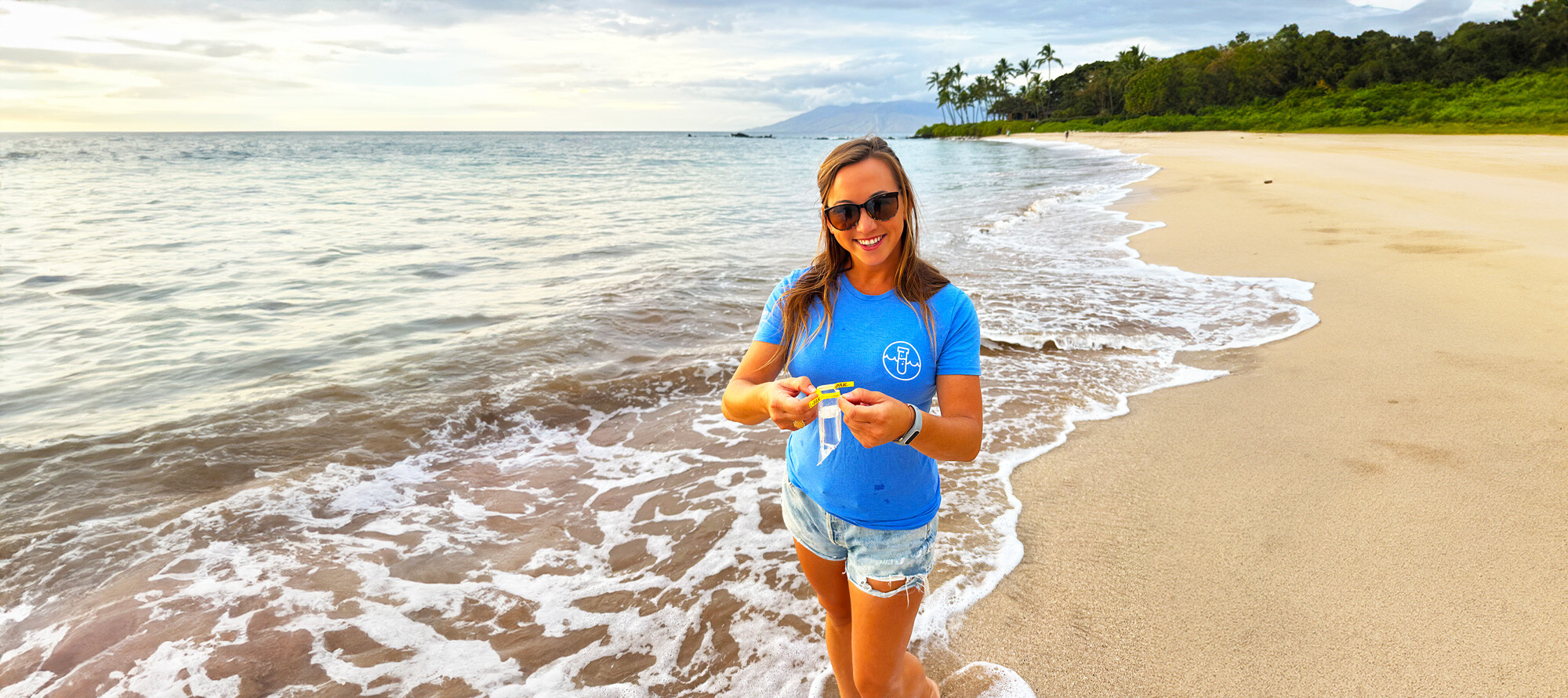
Q: What is your current role with the Surfrider Foundation?
I am the co-coordinator running the water testing lab for the Blue Water Task Force Maui chapter.
Q: Why and when did you get involved with the Surfrider Foundation?
I grew up in Santa Monica. After spending lots of time in and around the ocean, I became more passionate about protecting it. I joined some Surfrider beach cleanups when I was younger, but got more deeply involved when I moved to Maui in 2020. I was curious about water quality around Maui, especially after seeing people swim in the ocean after brown water rain and runoff events. It’s important to me to have direct positive impact by monitoring the water quality of beaches and sharing the data with the local community.

Q: What are some environmental issues that are affecting your local community?
Cesspools and runoff are major drivers of water pollution around Maui, and the rest of Hawai’i too. Cesspools leak nutrients, bacteria, and other pathogens into groundwater which then carries these contaminants to the ocean. There are an estimated 88,000 cesspools around Hawai’i that discharge millions of gallons of sewage into the ocean every day.
Additionally, the Lahaina fire on August 8, 2023 was the first major fire in an urban area next to the ocean, so now there is concern over toxic chemicals entering the ocean and having short and long-term impacts on human health and marine life.
Q: What Surfrider projects have you worked on?
My focus has primarily been water testing and expanding the number of test sites around Maui. We originally focused on North Shore beaches, then expanded to the eastern and southern parts of the island.
After the Maui fires in August 2023, we worked with other organizations and scientists to determine how post-fire toxins may impact ocean visitors, and sent a couple samples to a lab to test for heavy metals. This also prompted us to expand enterococcus bacteria testing to the Westside so we can be more informed about water quality around different parts of the island.

Q: Are there any specific projects that you have worked on that benefited your community?
Primarily I have strategized logistics for expanding our testing sites to cover more areas of the island and fill gaps where the state's Department of Health doesn’t test. I have attended events, like the Lima Festival in Hāna, to inform the community about what Surfrider BWTF does, which resulted in more local engagement. Additionally, I’ve been involved with brainstorming our approach to fire response and how to navigate this challenging situation in a way that best serves our community.
Q: What has been the highlight of your Surfrider experience?
Attending our Surfrider Hawai’i conference was a big highlight because we got to strategize with teams from other islands and learn from them. This was also right after the Maui fires, so we had a brainstorming session about disaster response and what Surfrider can do to support the community while staying aligned with Surfrider’s mission.

Q: Do you have any personal experiences or campaigns/issues you're passionate about where the social justice and environmental movements intersect?
I am very passionate about sharks and their important role in keeping the ocean balanced and healthy. I’ve done volunteer research with Shark Allies, focusing on the use of shark squalene in cosmetics. This is important not only for sharks, but for consumers to be aware of what they’re purchasing and putting on their bodies. Often cosmetic companies don’t realize the squalene they purchase comes from sharks, and can even incorrectly label their product as vegan or cruelty-free. The volunteer work I’ve done has focused on educating cosmetic companies about alternative plant-based squalene, and ultimately informing consumers of what to look for in cosmetic products.
Q: What can Surfrider do to foster an inclusive and welcoming experience? Do you have any examples where this is successfully happening?
Surfrider does a great job of collaborating with other organizations and attending community events around the island to encourage local involvement. Surfrider has held movie screenings and cleanups around the island, collaborated with the Pa’ia Youth & Cultural Center to educate children, and worked with local high schools to get students involved in BWTF. Surfrider could further represent the local community by recruiting more natives for leadership roles to share their experience and help increase engagement across native Hawaiians.

Q: What is the most important thing you tell others about Surfrider?
Surfrider’s programs have direct positive impact on the local community and environment, and it takes passionate volunteers to make it happen! Getting involved will increase impact by expanding the network and bringing up additional campaign ideas.
Q: Why is being a part of the Surfrider ocean conservation community important to you?
One of the first Hawaiian sayings I learned is "mālama i ke kai a e mālama ke kai iāʻoe" which means "care for the ocean and the ocean will care for you." The ocean is my happy place so it feels like my duty to do what I can to protect it and give back to the community!

